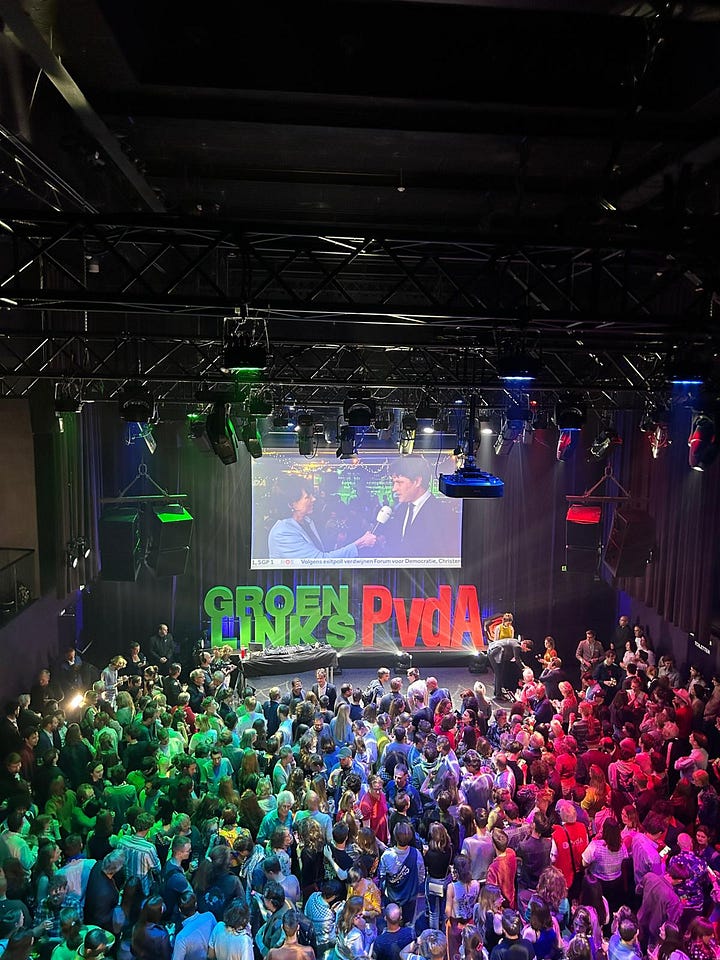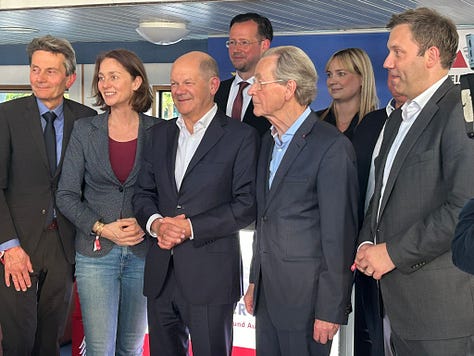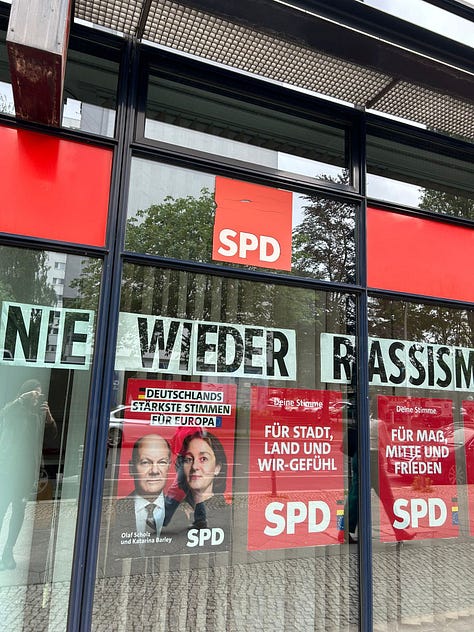Hello, and happy Friday!
This correspondence comes to you from the European Union, where the second-largest election of the year (after India’s) is currently underway. Across the bloc’s 27 member states, 373 million people are eligible to go to the polls to elect the 720 lawmakers who will makeup the next European Parliament. While the results are slowly beginning to trickle out—such as here in the Netherlands, where exit polls are being announced as I write this—the full results aren’t expected until after the vote ends on Sunday.
While the Netherlands isn’t necessarily a bellwether member state, its results could give us a sense of what to expect from the rest of the continent. As the polls closed, I was in the beautiful city of Utrecht, where backers of the Labor-GreenLeft alliance nervously gathered to await the results following weeks of national polls putting the hard-right firebrand Geert Wilders’ Party for Freedom well ahead. (Last year, Wilders shocked much of the world by winning the largest share of votes in the Dutch general election.) It was perhaps because of Wilders’ perceived advantage that the room erupted in cheers when the first exit poll showed the Labour-GreenLeft alliance securing the largest share of the country’s 31 seats (eight, down one from 2019). When the Party for Freedom was shown to have won seven—a notable six-seat increase from 2019, but a second-place finish nonetheless—they roared even louder.
I should note that with a margin of error of one seat, the Dutch race is technically still too close to call. Stay tuned for the final results on Sunday evening.


In Germany—where my reporting on the E.U. elections began—senior lawmakers, candidates, and analysts alike told me that they anticipate the far-right to perform similarly to how they did five years ago. To refresh your memory: The 2019 E.U. elections ended in victory for small, pro-European parties and the far-right (albeit less than originally anticipated). The biggest losers were the traditional center-ground parties.



The tentative Dutch results show that the center may yet have a chance to hold, if only just. But the polls in Europe’s biggest powers show a mixed picture. In Germany, national polls put the ruling Social Democrats on par with the far-right Alternative for Germany, both of which are trailing the opposition center-right CDU by 14 points. The Social Democrats’ coalition partners—the Greens and the liberal FDP—are trailing all three alongside the country’s far-left parties.
In France, Marine Le Pen’s far-right National Rally is well ahead in the polls, followed by French President Emmanuel Macron’s ruling En Marche and the left-wing Parti Socialist.
In Italy, Italian Prime Minister Giorgia Meloni’s far-right Brothers of Italy are similarly leading ahead of the opposition Democratic Party and, behind them, the populist Five Star Movement.
All will be revealed on Sunday. Watch this space! Or, rather, this space.
What I’ve written
I’ve been out reporting all week, but I’ll have plenty more to say on Europe in the coming days. Watch this space!
What I’ve read
It’s not Islamophobia, it’s anti-Palestinian racism • By Abdallah Fayyad in Vox
Efforts to ban the keffiyeh, the traditional Palestinian scarf that is a cultural but not religious piece of clothing, are very specifically targeting Palestinians. Actively avoiding the use of terminology that describes the Palestinian experience, including the word “Palestine” in many media outlets, is a form of discrimination against Palestinians, not Muslims.
‘We Are the World Power.’ How Joe Biden Leads • By Massimo Calabresi in TIME
Asked if Israeli forces have committed war crimes in Gaza, Biden says, “It’s uncertain.” From the start, the Administration knew Israel was pushing the limits of legal warfare, the Washington Post and others have reported. The conflict is driving a wedge between the U.S. and its allies. On May 31, Biden laid out a phased cease-fire plan that would end the war and secure the release of hostages. He has continued to pursue the complicated regional deal with Saudi Arabia. Some close to Biden say the only holdout to the broader pact is Netanyahu. The President declines to say as much, but when asked by TIME if Netanyahu is prolonging the war for his own political reasons, Biden admits, “There is every reason for people to draw that conclusion.”
My Father’s Fate, and India’s • By Kapil Komireddi in the New Yorker
“If you can bring yourself to look beyond the regime,” he told me, in 2021, “you will see a people fighting with all their strength to preserve their dignity and realize the promise of democracy.”
What I’ve been thinking about
This incredible song by a bunch of Irish tweens has only just been brought to my attention. It may well be the song of the summer.
À bientôt,
Yasmeen



